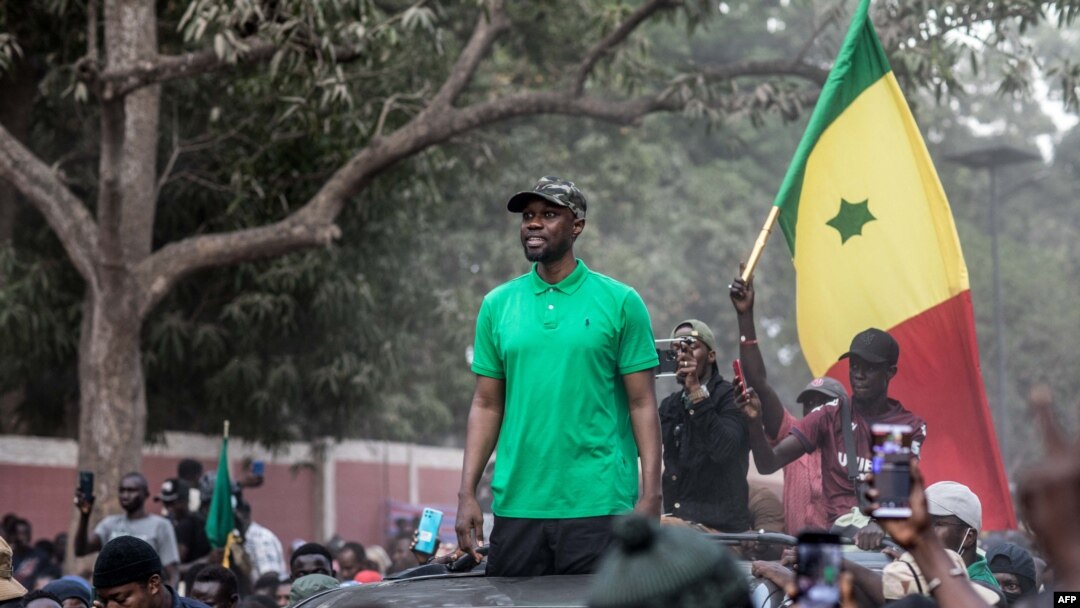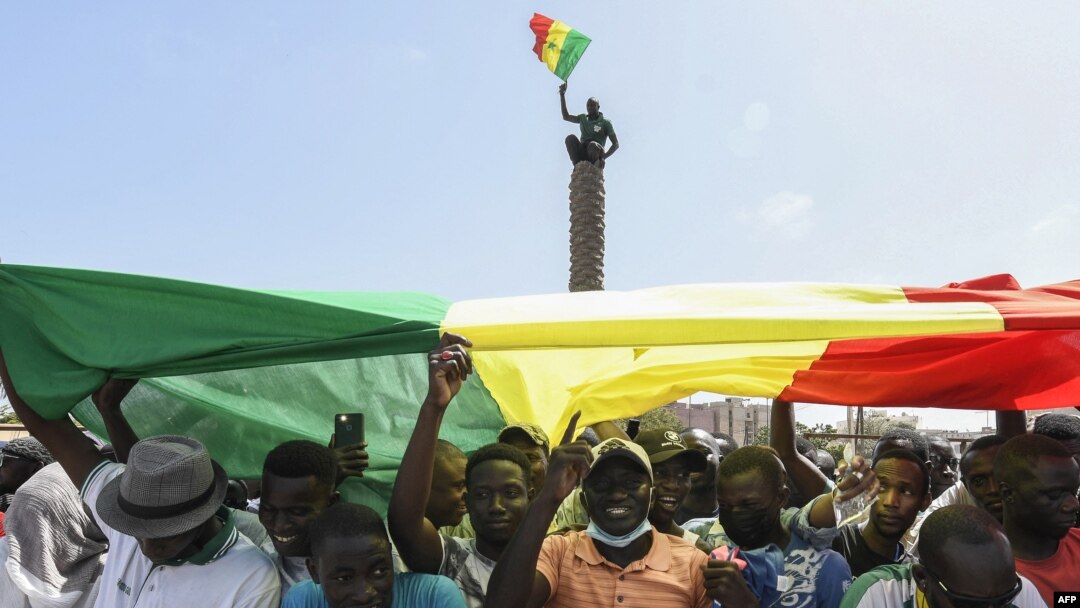The moderately stable West African state is celebrated in the region for upholding democratic principles — one that could have been in jeopardy had Sall refused to bow to pressure from Senegalese youth against a third term bid, democracy advocates say.
Official campaigning in the lead-up to the February 2024 presidential election has yet to begin, but speculation over the front-runners for Senegal’s top job are heating up, as Sall’s main opponent Ousmane Sonko, head of the Pastef opposition party, has vowed to disrupt the vote if he’s unable to run.

FILE - Opposition leader, Ousmane Sonko, looks on during a meeting in Ziguinchor on May 24, 2023. Thousands of supporters gathered in Ziguinchor against his arrest during a rape trial.
"There will be no elections in this country, or there will be indescribable chaos if President Macky Sall uses judicial tricks to prevent my candidacy," the 48-year-old said in an interview with France24 last week.
Sonko is serving a two-year prison sentence under house arrest for "corrupting the youth." It is not clear if he’ll appeal the conviction and what his fate will be in the race for the Senegalese presidency.
Dakar-based political analyst Babacar Dione told VOA that contesting candidates will not be announced until January next year by the Constitutional Council — "giving voters very little time to form a precise idea of the best profile." But he added that Senegalese voters already know those likely to run and have "a clear idea of what they are capable of doing or not doing."
Dione says unlike the 2019 election where the application of a "hasty new law" on candidate sponsorship prevented several political parties from participating in the elections, the 2024 elections "will be less stringent," adding that this, however, may present "complications for candidates who do not have national stature."
"We expect at least one candidate from the ranks of the majority — could be the current Prime Minister Amadou Ba, or Boun Abdallah Dionne, who preceded him," he said.
"Khalifa Sall and Karim Wade are also back on the political scene after several years of absence. Both men are expected to take advantage of changes to the law currently before the National Assembly to regain their civil rights and thus be able to take part in the 2024 presidential elections."
"There's also Idrissa Seck, who came second to Macky Sall in the 2019 presidential election --even if this second place is largely due to the absence of Karim Wade and Khalifa Sall. Seck has a large number of voters, particularly in the Mouride religious city of Touba and in Dakar," Dione added.
Idrissa Seck, 63, Rewmi Party
In April, the presidency announced that it had relieved Idrissa Seck, a former prime minister, from his role as chair of the Economic, Social and Environmental Council, paving the way for him to vie for the country’s top job.
FILE - Idrissa Seck, president of the Rewmi party and candidate for the 2019 Senegal presidential election, is pictured during a press conference of the opposition at the headquarters of the liberal Bokk Gis Gis (BGG) party in Dakar on Jan. 15, 2019.
Seck has confirmed his intention to run again for the fourth time early next year and told VOA that he'll lead his Rewmi party’s ticket. Rewmi joined the ruling Benno Yakaar coalition with President Sall in 2019, when Seck placed second in the presidential election with 21% of votes cast.
"Today, I maintain my position as president of Rewmi and will be running for president under this banner. To continue Senegal’s upward trajectory and our overall development, we need a steady hand. We need balanced, thoughtful and servant leadership," Seck told VOA.
Seck served jail time between 2005 and 2006 when he fell out with former Senegalese President Abdoulaye Wade, and so he says he understands the dilemma of Sonko and his supporters — "anyone who is qualified to run for office, should be allowed to do so freely."
"I empathize with the youth of our country, many of whom are frustrated, and rightly so, with the perception that basic political rights are under threat in our country," Seck said.
"But Senegal is also a nation that respects our constitution and adheres to the laws of the land."
FILE - Karim Wade, son of former Senegalese President Abdoulaye Wade, arrives at a courthouse in Dakar, Senegal, flanked by two prison guards on July 31, 2014 for the start of his trial on embezzlement.
Karim Wade, 54, Senegalese Democratic Party (PDS)
To ease conflict in the upcoming polls, a board known as the Political Commission of National Dialogue proposed changes to Senegal's electoral law to enable two opposition figures — Wade and Khalifa Sall — to participate in the presidential elections, Reuters reported in June.
Wade is an ex-minister and son of former President Wade who was sentenced to prison in 2015 for embezzlement. He, like Sall, the former mayor of Dakar, was disqualified from the 2019 elections despite being pardoned by President Sall.
VOA reached out to representatives from Wade's team for remarks, but they declined to comment.
FILE - Dakar's mayor and head of the African Union’s observation team Khalifa Ababacar Sall speaks during a press conference, on March 13, 2011 in Niamey after Saturday's presidential runoff.
Khalifa Sall, 67, Manko Taxawu Senegal (MTS)
Dakar's former mayor Khalifa Sall was jailed for corruption in 2018. Sall, who has no relation to the Senegalese president, was arrested in March 2017 for embezzling 1.8 billion CFA francs ($3 million) in public funds. He was sentenced to five years in prison the following year, but was pardoned by President Sall in September 2019.
Elhadji Ndiaye, a spokesman for Sall told VOA that Sall's credentials including his "mastery of the political, social and economic issues of the day, makes him one of the big favorites in the presidential election of February 2024."
"Sall has solid experience and in-depth knowledge of the workings of government. He has been elected several times as a member of parliament, mayor of a commune and mayor of the capital Dakar, and has twice been appointed Minister of the Republic. He makes good governance, respect for the rule of law and the preservation of social cohesion a common goal," Ndiaye said.
Both leading opposition figures have not confirmed their intention to run in the February 25 elections, and Senegal's ruling Benno Yakaar coalition has yet to name a candidate.
In 2019, five candidates were approved to run in the presidential election — the first time a few candidates ran in Senegal's presidential election since 1988 —Macky Sall, Idrissa Seck, Ousmane Sonko, Issa Sall of the Party of Unity and Rally, and Madické Niang.
Niang was expelled from the opposition PDS when he announced his candidature for the presidential election.


